MGMT6018 - Singapore's Legal System: Business Law & Contexts
VerifiedAdded on 2024/05/16
|10
|1983
|148
Report
AI Summary
This report provides an overview of the Singapore legal system, focusing on key aspects such as the legal structure, Contract Act (emphasizing its similarities to UK law), Agency and Employment Law (including agent types and employee protections), Intellectual Property (patent, copyright, trademark and Singapore's IP protection framework), and Law of Torts (including negligence and landmark cases like Donoghue v Stevenson). The report references key legal concepts like 'duty of care' and 'damnum sine injuria' and concludes by summarizing the various laws and their implications within the Singaporean context.
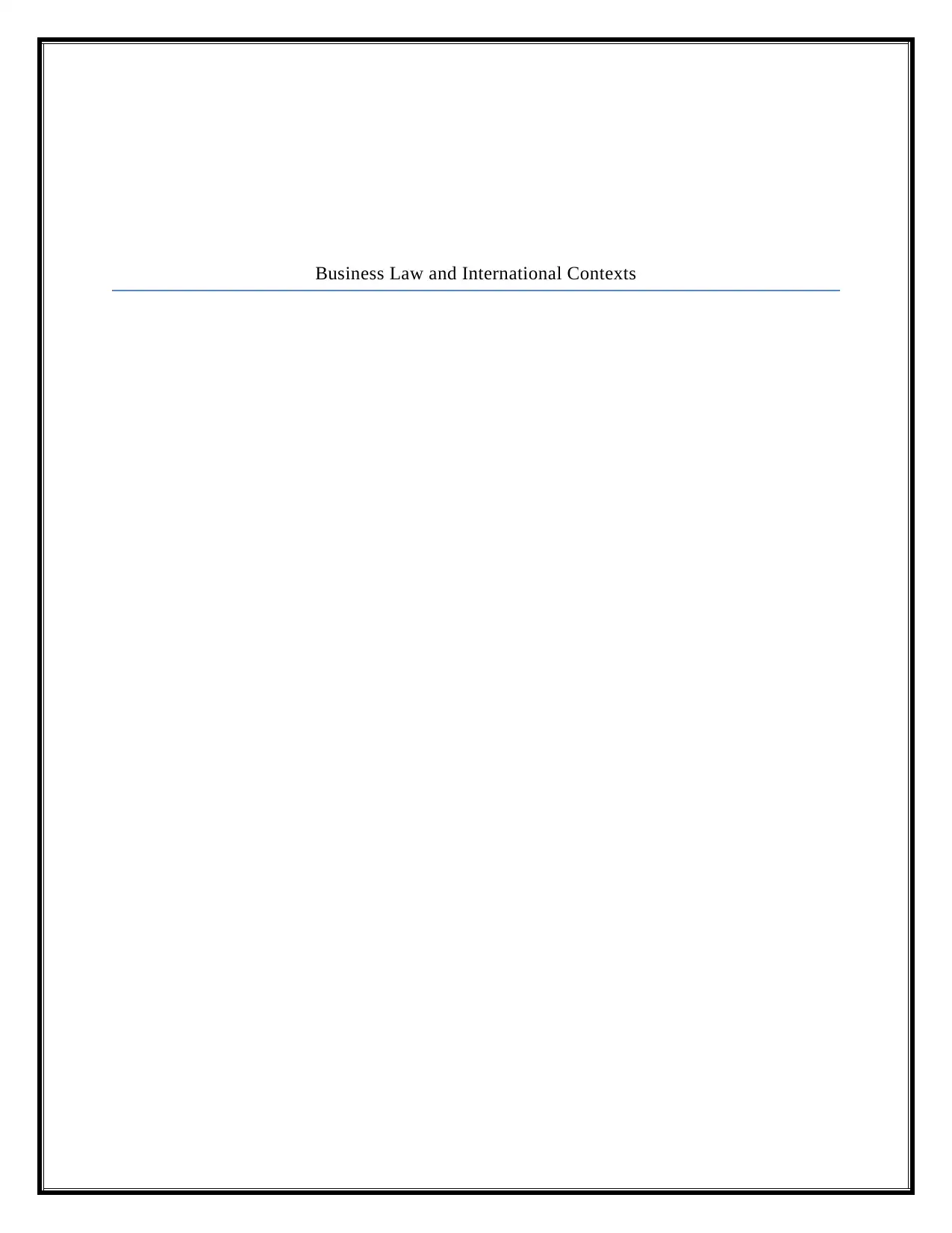
Business Law and International Contexts
Paraphrase This Document
Need a fresh take? Get an instant paraphrase of this document with our AI Paraphraser
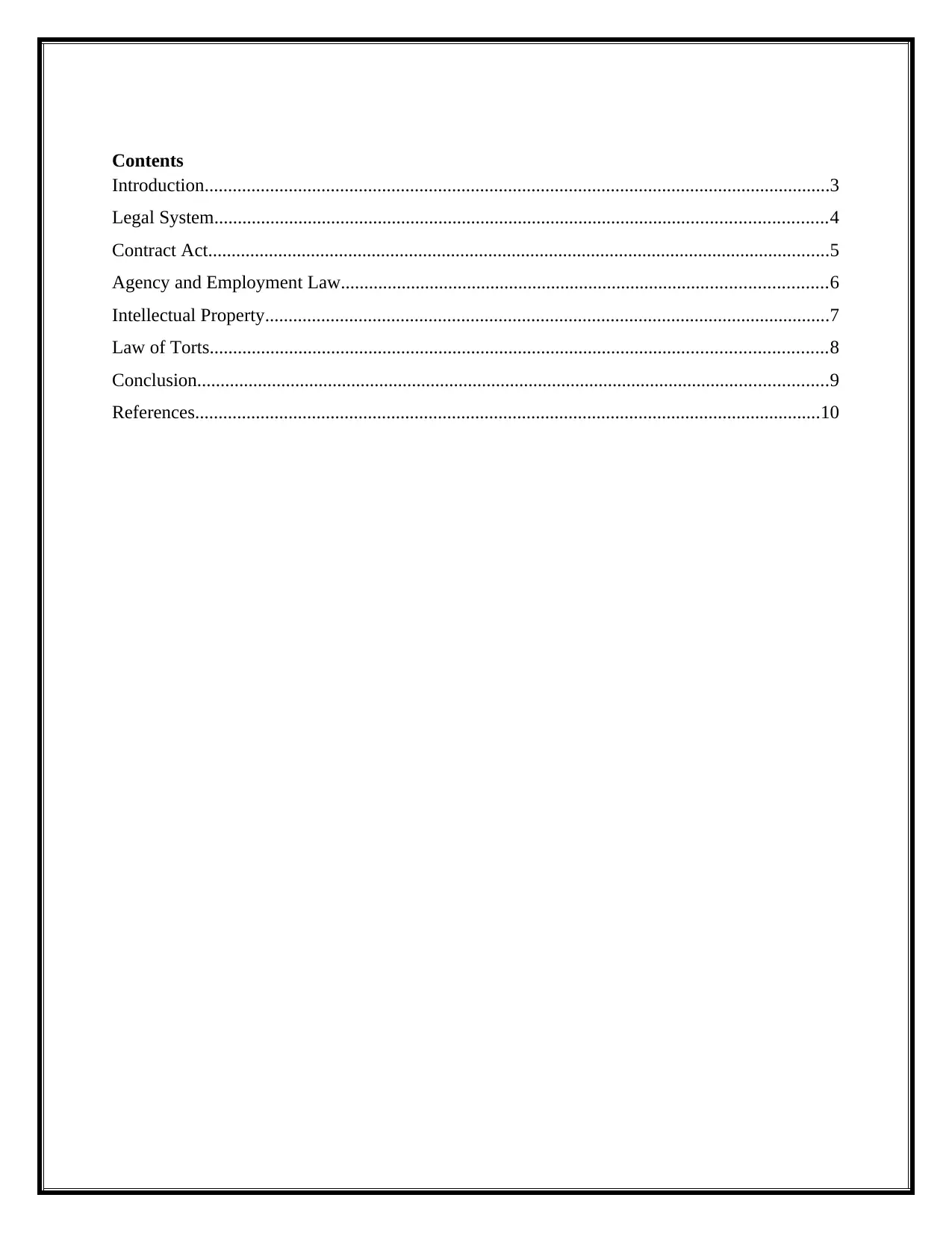
Contents
Introduction......................................................................................................................................3
Legal System...................................................................................................................................4
Contract Act.....................................................................................................................................5
Agency and Employment Law........................................................................................................6
Intellectual Property.........................................................................................................................7
Law of Torts....................................................................................................................................8
Conclusion.......................................................................................................................................9
References......................................................................................................................................10
Introduction......................................................................................................................................3
Legal System...................................................................................................................................4
Contract Act.....................................................................................................................................5
Agency and Employment Law........................................................................................................6
Intellectual Property.........................................................................................................................7
Law of Torts....................................................................................................................................8
Conclusion.......................................................................................................................................9
References......................................................................................................................................10
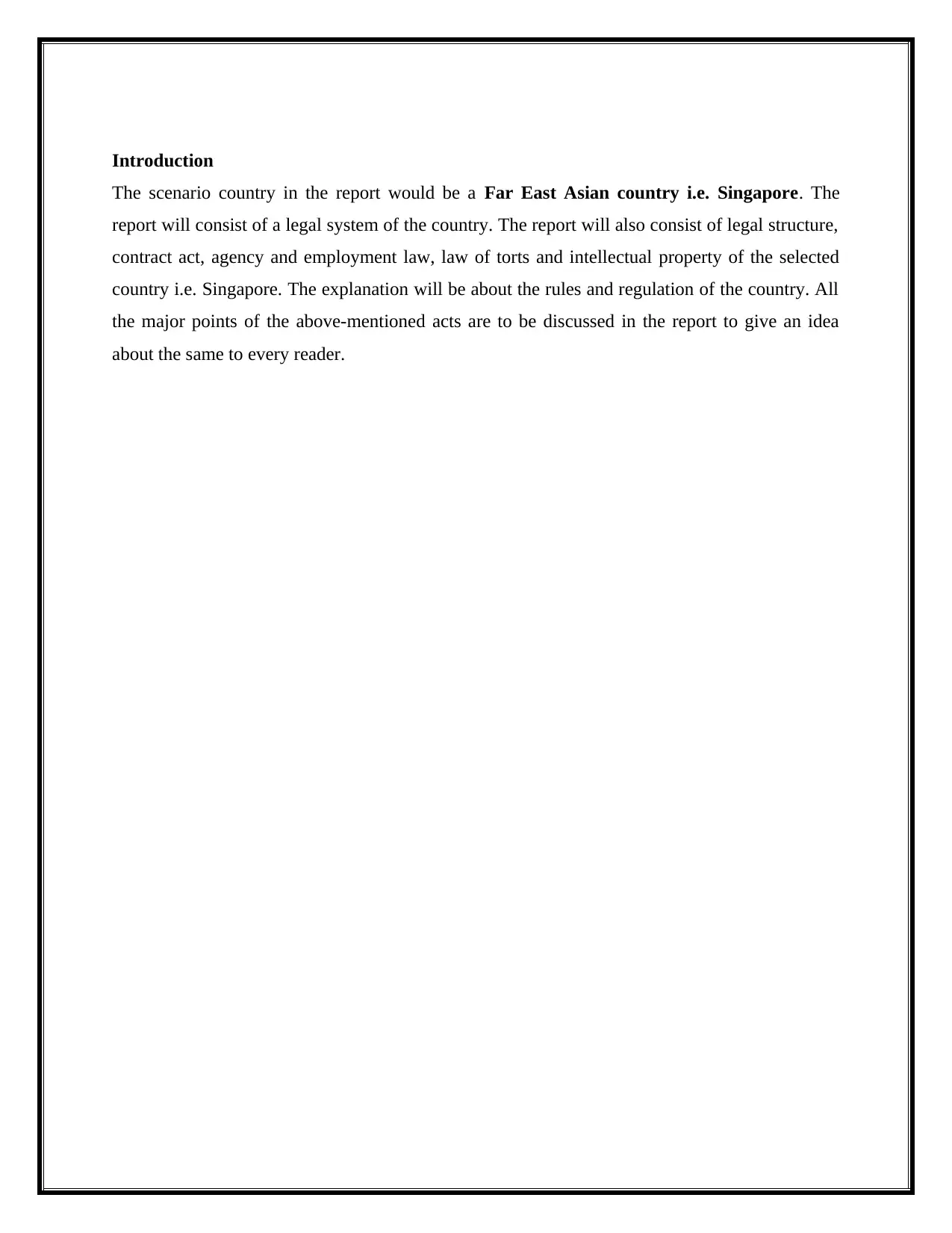
Introduction
The scenario country in the report would be a Far East Asian country i.e. Singapore. The
report will consist of a legal system of the country. The report will also consist of legal structure,
contract act, agency and employment law, law of torts and intellectual property of the selected
country i.e. Singapore. The explanation will be about the rules and regulation of the country. All
the major points of the above-mentioned acts are to be discussed in the report to give an idea
about the same to every reader.
The scenario country in the report would be a Far East Asian country i.e. Singapore. The
report will consist of a legal system of the country. The report will also consist of legal structure,
contract act, agency and employment law, law of torts and intellectual property of the selected
country i.e. Singapore. The explanation will be about the rules and regulation of the country. All
the major points of the above-mentioned acts are to be discussed in the report to give an idea
about the same to every reader.
⊘ This is a preview!⊘
Do you want full access?
Subscribe today to unlock all pages.

Trusted by 1+ million students worldwide
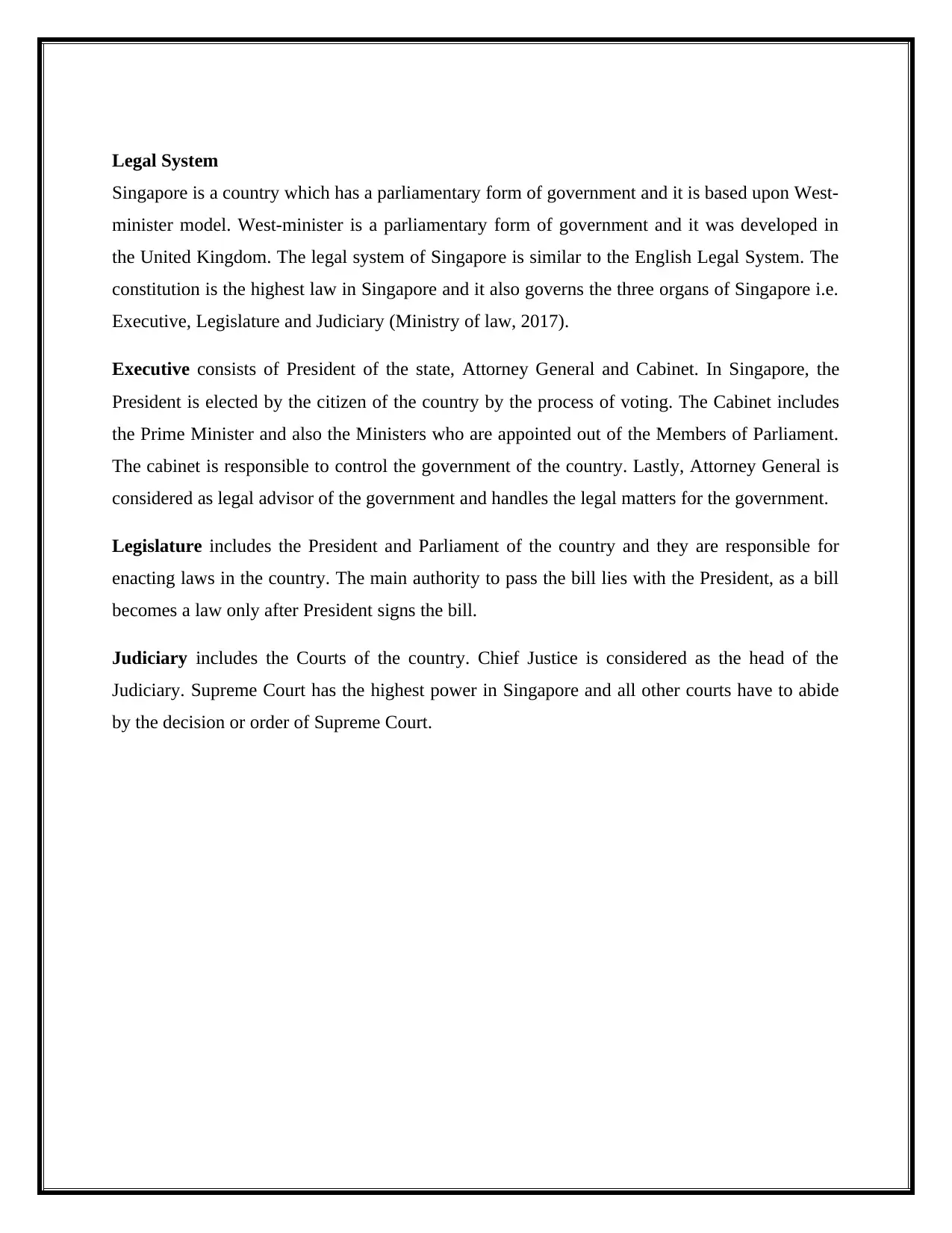
Legal System
Singapore is a country which has a parliamentary form of government and it is based upon West-
minister model. West-minister is a parliamentary form of government and it was developed in
the United Kingdom. The legal system of Singapore is similar to the English Legal System. The
constitution is the highest law in Singapore and it also governs the three organs of Singapore i.e.
Executive, Legislature and Judiciary (Ministry of law, 2017).
Executive consists of President of the state, Attorney General and Cabinet. In Singapore, the
President is elected by the citizen of the country by the process of voting. The Cabinet includes
the Prime Minister and also the Ministers who are appointed out of the Members of Parliament.
The cabinet is responsible to control the government of the country. Lastly, Attorney General is
considered as legal advisor of the government and handles the legal matters for the government.
Legislature includes the President and Parliament of the country and they are responsible for
enacting laws in the country. The main authority to pass the bill lies with the President, as a bill
becomes a law only after President signs the bill.
Judiciary includes the Courts of the country. Chief Justice is considered as the head of the
Judiciary. Supreme Court has the highest power in Singapore and all other courts have to abide
by the decision or order of Supreme Court.
Singapore is a country which has a parliamentary form of government and it is based upon West-
minister model. West-minister is a parliamentary form of government and it was developed in
the United Kingdom. The legal system of Singapore is similar to the English Legal System. The
constitution is the highest law in Singapore and it also governs the three organs of Singapore i.e.
Executive, Legislature and Judiciary (Ministry of law, 2017).
Executive consists of President of the state, Attorney General and Cabinet. In Singapore, the
President is elected by the citizen of the country by the process of voting. The Cabinet includes
the Prime Minister and also the Ministers who are appointed out of the Members of Parliament.
The cabinet is responsible to control the government of the country. Lastly, Attorney General is
considered as legal advisor of the government and handles the legal matters for the government.
Legislature includes the President and Parliament of the country and they are responsible for
enacting laws in the country. The main authority to pass the bill lies with the President, as a bill
becomes a law only after President signs the bill.
Judiciary includes the Courts of the country. Chief Justice is considered as the head of the
Judiciary. Supreme Court has the highest power in Singapore and all other courts have to abide
by the decision or order of Supreme Court.
Paraphrase This Document
Need a fresh take? Get an instant paraphrase of this document with our AI Paraphraser
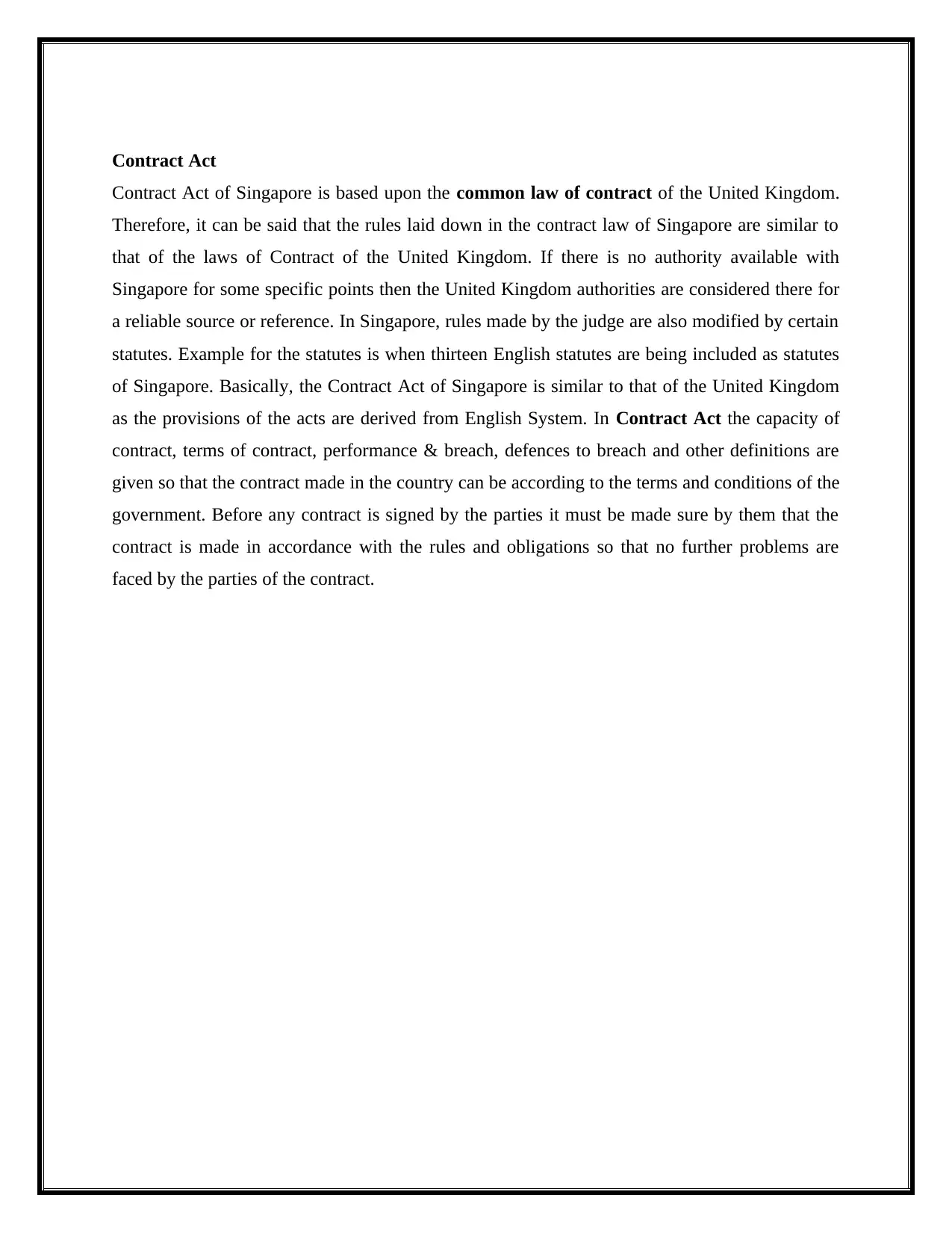
Contract Act
Contract Act of Singapore is based upon the common law of contract of the United Kingdom.
Therefore, it can be said that the rules laid down in the contract law of Singapore are similar to
that of the laws of Contract of the United Kingdom. If there is no authority available with
Singapore for some specific points then the United Kingdom authorities are considered there for
a reliable source or reference. In Singapore, rules made by the judge are also modified by certain
statutes. Example for the statutes is when thirteen English statutes are being included as statutes
of Singapore. Basically, the Contract Act of Singapore is similar to that of the United Kingdom
as the provisions of the acts are derived from English System. In Contract Act the capacity of
contract, terms of contract, performance & breach, defences to breach and other definitions are
given so that the contract made in the country can be according to the terms and conditions of the
government. Before any contract is signed by the parties it must be made sure by them that the
contract is made in accordance with the rules and obligations so that no further problems are
faced by the parties of the contract.
Contract Act of Singapore is based upon the common law of contract of the United Kingdom.
Therefore, it can be said that the rules laid down in the contract law of Singapore are similar to
that of the laws of Contract of the United Kingdom. If there is no authority available with
Singapore for some specific points then the United Kingdom authorities are considered there for
a reliable source or reference. In Singapore, rules made by the judge are also modified by certain
statutes. Example for the statutes is when thirteen English statutes are being included as statutes
of Singapore. Basically, the Contract Act of Singapore is similar to that of the United Kingdom
as the provisions of the acts are derived from English System. In Contract Act the capacity of
contract, terms of contract, performance & breach, defences to breach and other definitions are
given so that the contract made in the country can be according to the terms and conditions of the
government. Before any contract is signed by the parties it must be made sure by them that the
contract is made in accordance with the rules and obligations so that no further problems are
faced by the parties of the contract.
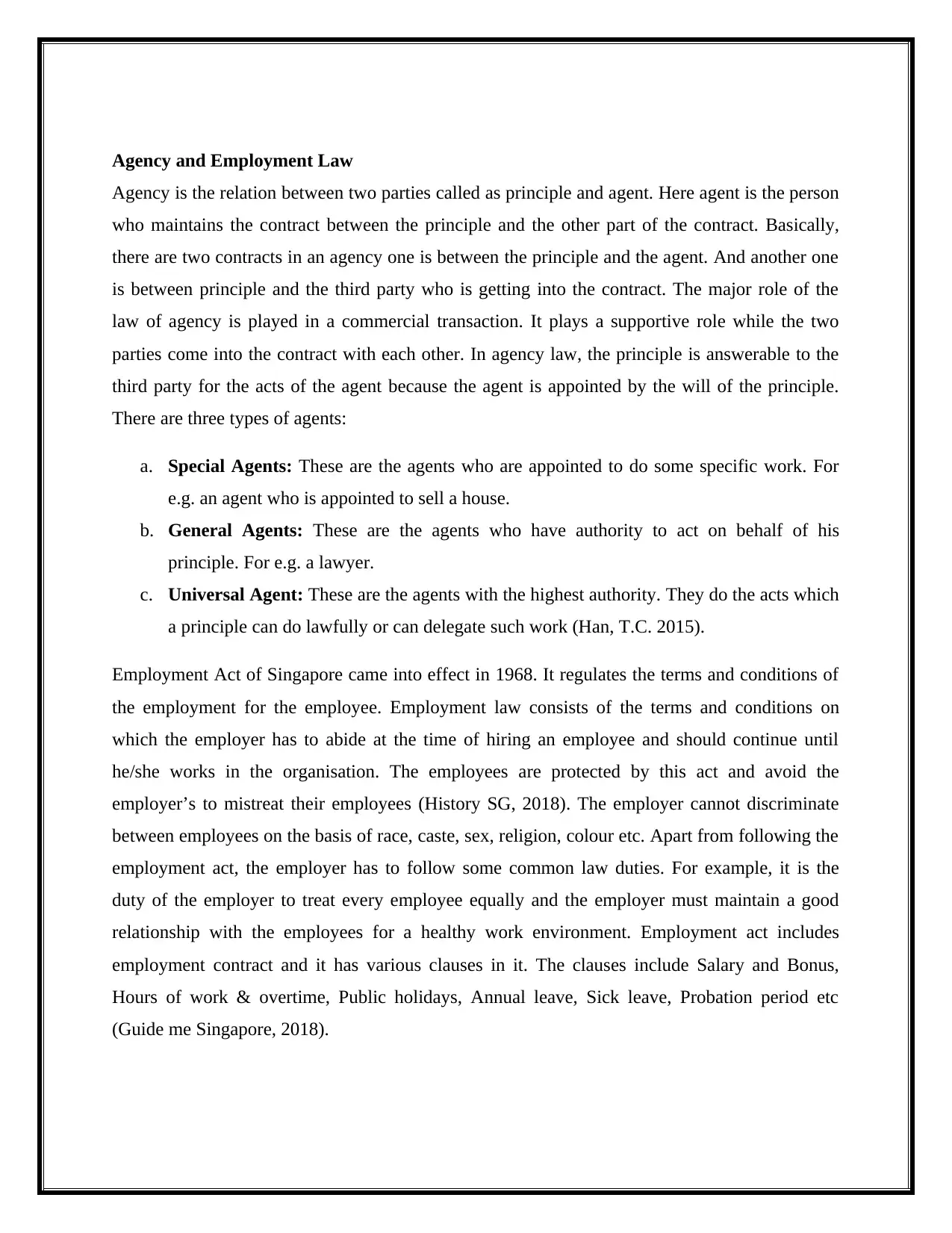
Agency and Employment Law
Agency is the relation between two parties called as principle and agent. Here agent is the person
who maintains the contract between the principle and the other part of the contract. Basically,
there are two contracts in an agency one is between the principle and the agent. And another one
is between principle and the third party who is getting into the contract. The major role of the
law of agency is played in a commercial transaction. It plays a supportive role while the two
parties come into the contract with each other. In agency law, the principle is answerable to the
third party for the acts of the agent because the agent is appointed by the will of the principle.
There are three types of agents:
a. Special Agents: These are the agents who are appointed to do some specific work. For
e.g. an agent who is appointed to sell a house.
b. General Agents: These are the agents who have authority to act on behalf of his
principle. For e.g. a lawyer.
c. Universal Agent: These are the agents with the highest authority. They do the acts which
a principle can do lawfully or can delegate such work (Han, T.C. 2015).
Employment Act of Singapore came into effect in 1968. It regulates the terms and conditions of
the employment for the employee. Employment law consists of the terms and conditions on
which the employer has to abide at the time of hiring an employee and should continue until
he/she works in the organisation. The employees are protected by this act and avoid the
employer’s to mistreat their employees (History SG, 2018). The employer cannot discriminate
between employees on the basis of race, caste, sex, religion, colour etc. Apart from following the
employment act, the employer has to follow some common law duties. For example, it is the
duty of the employer to treat every employee equally and the employer must maintain a good
relationship with the employees for a healthy work environment. Employment act includes
employment contract and it has various clauses in it. The clauses include Salary and Bonus,
Hours of work & overtime, Public holidays, Annual leave, Sick leave, Probation period etc
(Guide me Singapore, 2018).
Agency is the relation between two parties called as principle and agent. Here agent is the person
who maintains the contract between the principle and the other part of the contract. Basically,
there are two contracts in an agency one is between the principle and the agent. And another one
is between principle and the third party who is getting into the contract. The major role of the
law of agency is played in a commercial transaction. It plays a supportive role while the two
parties come into the contract with each other. In agency law, the principle is answerable to the
third party for the acts of the agent because the agent is appointed by the will of the principle.
There are three types of agents:
a. Special Agents: These are the agents who are appointed to do some specific work. For
e.g. an agent who is appointed to sell a house.
b. General Agents: These are the agents who have authority to act on behalf of his
principle. For e.g. a lawyer.
c. Universal Agent: These are the agents with the highest authority. They do the acts which
a principle can do lawfully or can delegate such work (Han, T.C. 2015).
Employment Act of Singapore came into effect in 1968. It regulates the terms and conditions of
the employment for the employee. Employment law consists of the terms and conditions on
which the employer has to abide at the time of hiring an employee and should continue until
he/she works in the organisation. The employees are protected by this act and avoid the
employer’s to mistreat their employees (History SG, 2018). The employer cannot discriminate
between employees on the basis of race, caste, sex, religion, colour etc. Apart from following the
employment act, the employer has to follow some common law duties. For example, it is the
duty of the employer to treat every employee equally and the employer must maintain a good
relationship with the employees for a healthy work environment. Employment act includes
employment contract and it has various clauses in it. The clauses include Salary and Bonus,
Hours of work & overtime, Public holidays, Annual leave, Sick leave, Probation period etc
(Guide me Singapore, 2018).
⊘ This is a preview!⊘
Do you want full access?
Subscribe today to unlock all pages.

Trusted by 1+ million students worldwide
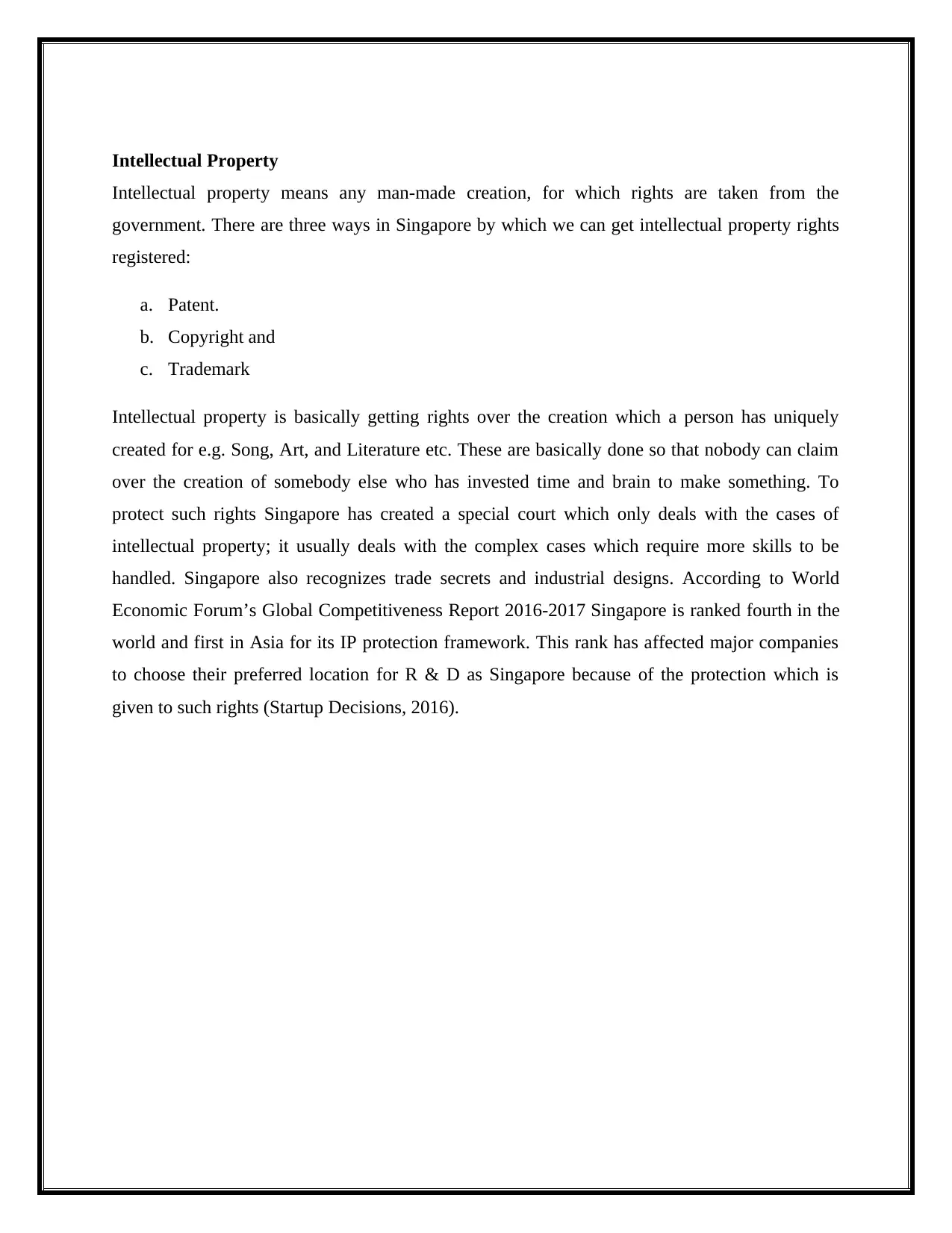
Intellectual Property
Intellectual property means any man-made creation, for which rights are taken from the
government. There are three ways in Singapore by which we can get intellectual property rights
registered:
a. Patent.
b. Copyright and
c. Trademark
Intellectual property is basically getting rights over the creation which a person has uniquely
created for e.g. Song, Art, and Literature etc. These are basically done so that nobody can claim
over the creation of somebody else who has invested time and brain to make something. To
protect such rights Singapore has created a special court which only deals with the cases of
intellectual property; it usually deals with the complex cases which require more skills to be
handled. Singapore also recognizes trade secrets and industrial designs. According to World
Economic Forum’s Global Competitiveness Report 2016-2017 Singapore is ranked fourth in the
world and first in Asia for its IP protection framework. This rank has affected major companies
to choose their preferred location for R & D as Singapore because of the protection which is
given to such rights (Startup Decisions, 2016).
Intellectual property means any man-made creation, for which rights are taken from the
government. There are three ways in Singapore by which we can get intellectual property rights
registered:
a. Patent.
b. Copyright and
c. Trademark
Intellectual property is basically getting rights over the creation which a person has uniquely
created for e.g. Song, Art, and Literature etc. These are basically done so that nobody can claim
over the creation of somebody else who has invested time and brain to make something. To
protect such rights Singapore has created a special court which only deals with the cases of
intellectual property; it usually deals with the complex cases which require more skills to be
handled. Singapore also recognizes trade secrets and industrial designs. According to World
Economic Forum’s Global Competitiveness Report 2016-2017 Singapore is ranked fourth in the
world and first in Asia for its IP protection framework. This rank has affected major companies
to choose their preferred location for R & D as Singapore because of the protection which is
given to such rights (Startup Decisions, 2016).
Paraphrase This Document
Need a fresh take? Get an instant paraphrase of this document with our AI Paraphraser
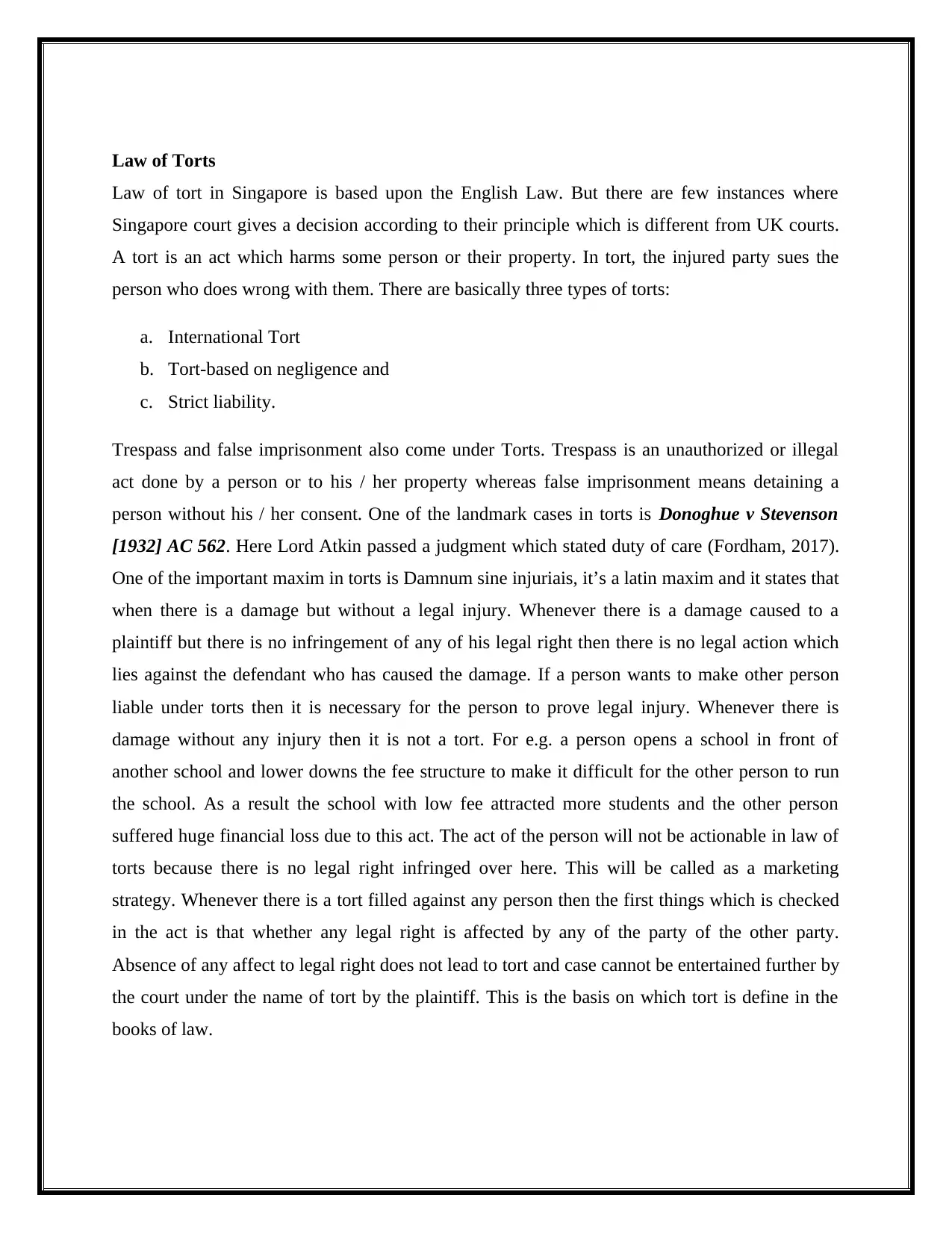
Law of Torts
Law of tort in Singapore is based upon the English Law. But there are few instances where
Singapore court gives a decision according to their principle which is different from UK courts.
A tort is an act which harms some person or their property. In tort, the injured party sues the
person who does wrong with them. There are basically three types of torts:
a. International Tort
b. Tort-based on negligence and
c. Strict liability.
Trespass and false imprisonment also come under Torts. Trespass is an unauthorized or illegal
act done by a person or to his / her property whereas false imprisonment means detaining a
person without his / her consent. One of the landmark cases in torts is Donoghue v Stevenson
[1932] AC 562. Here Lord Atkin passed a judgment which stated duty of care (Fordham, 2017).
One of the important maxim in torts is Damnum sine injuriais, it’s a latin maxim and it states that
when there is a damage but without a legal injury. Whenever there is a damage caused to a
plaintiff but there is no infringement of any of his legal right then there is no legal action which
lies against the defendant who has caused the damage. If a person wants to make other person
liable under torts then it is necessary for the person to prove legal injury. Whenever there is
damage without any injury then it is not a tort. For e.g. a person opens a school in front of
another school and lower downs the fee structure to make it difficult for the other person to run
the school. As a result the school with low fee attracted more students and the other person
suffered huge financial loss due to this act. The act of the person will not be actionable in law of
torts because there is no legal right infringed over here. This will be called as a marketing
strategy. Whenever there is a tort filled against any person then the first things which is checked
in the act is that whether any legal right is affected by any of the party of the other party.
Absence of any affect to legal right does not lead to tort and case cannot be entertained further by
the court under the name of tort by the plaintiff. This is the basis on which tort is define in the
books of law.
Law of tort in Singapore is based upon the English Law. But there are few instances where
Singapore court gives a decision according to their principle which is different from UK courts.
A tort is an act which harms some person or their property. In tort, the injured party sues the
person who does wrong with them. There are basically three types of torts:
a. International Tort
b. Tort-based on negligence and
c. Strict liability.
Trespass and false imprisonment also come under Torts. Trespass is an unauthorized or illegal
act done by a person or to his / her property whereas false imprisonment means detaining a
person without his / her consent. One of the landmark cases in torts is Donoghue v Stevenson
[1932] AC 562. Here Lord Atkin passed a judgment which stated duty of care (Fordham, 2017).
One of the important maxim in torts is Damnum sine injuriais, it’s a latin maxim and it states that
when there is a damage but without a legal injury. Whenever there is a damage caused to a
plaintiff but there is no infringement of any of his legal right then there is no legal action which
lies against the defendant who has caused the damage. If a person wants to make other person
liable under torts then it is necessary for the person to prove legal injury. Whenever there is
damage without any injury then it is not a tort. For e.g. a person opens a school in front of
another school and lower downs the fee structure to make it difficult for the other person to run
the school. As a result the school with low fee attracted more students and the other person
suffered huge financial loss due to this act. The act of the person will not be actionable in law of
torts because there is no legal right infringed over here. This will be called as a marketing
strategy. Whenever there is a tort filled against any person then the first things which is checked
in the act is that whether any legal right is affected by any of the party of the other party.
Absence of any affect to legal right does not lead to tort and case cannot be entertained further by
the court under the name of tort by the plaintiff. This is the basis on which tort is define in the
books of law.
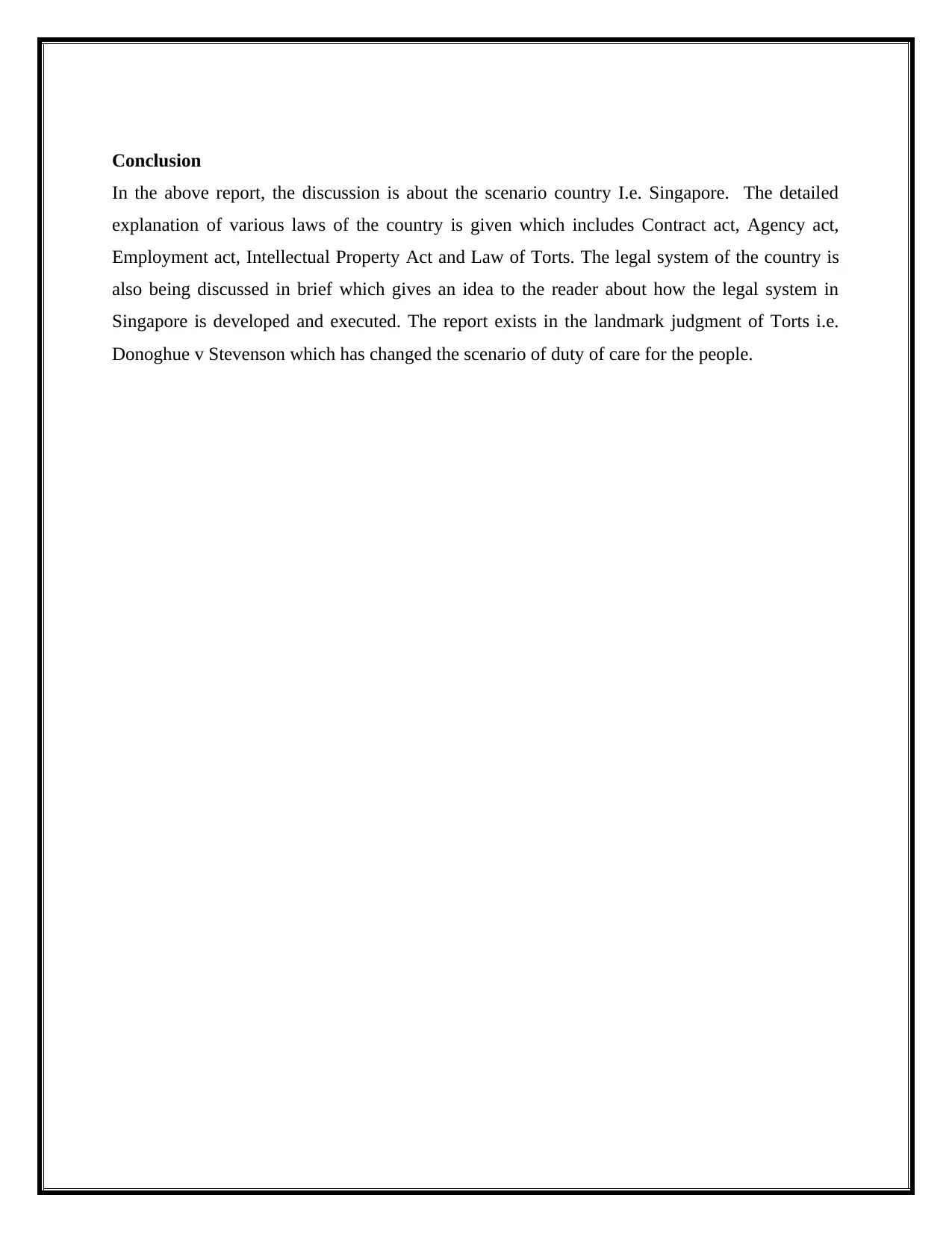
Conclusion
In the above report, the discussion is about the scenario country I.e. Singapore. The detailed
explanation of various laws of the country is given which includes Contract act, Agency act,
Employment act, Intellectual Property Act and Law of Torts. The legal system of the country is
also being discussed in brief which gives an idea to the reader about how the legal system in
Singapore is developed and executed. The report exists in the landmark judgment of Torts i.e.
Donoghue v Stevenson which has changed the scenario of duty of care for the people.
In the above report, the discussion is about the scenario country I.e. Singapore. The detailed
explanation of various laws of the country is given which includes Contract act, Agency act,
Employment act, Intellectual Property Act and Law of Torts. The legal system of the country is
also being discussed in brief which gives an idea to the reader about how the legal system in
Singapore is developed and executed. The report exists in the landmark judgment of Torts i.e.
Donoghue v Stevenson which has changed the scenario of duty of care for the people.
⊘ This is a preview!⊘
Do you want full access?
Subscribe today to unlock all pages.

Trusted by 1+ million students worldwide
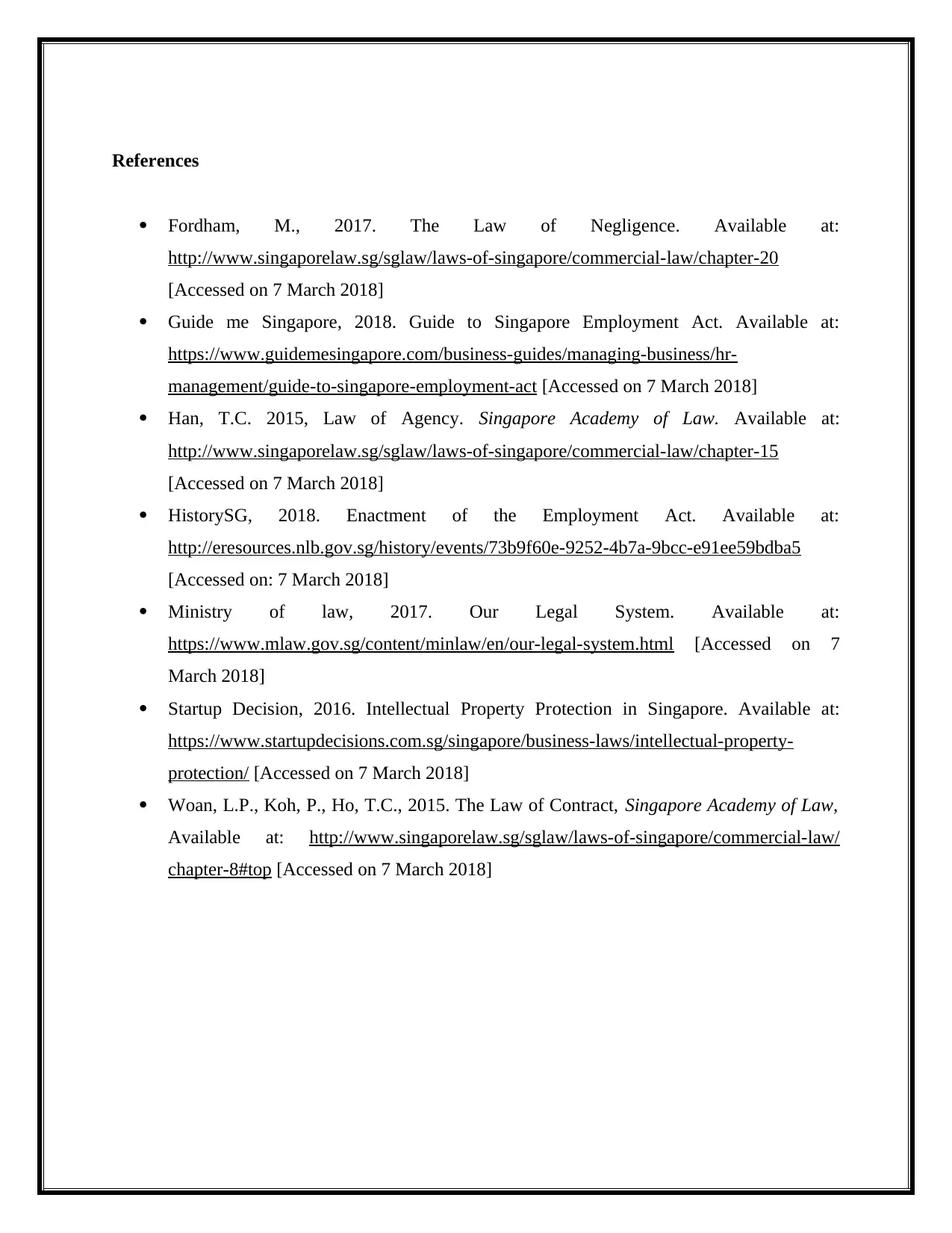
References
Fordham, M., 2017. The Law of Negligence. Available at:
http://www.singaporelaw.sg/sglaw/laws-of-singapore/commercial-law/chapter-20
[Accessed on 7 March 2018]
Guide me Singapore, 2018. Guide to Singapore Employment Act. Available at:
https://www.guidemesingapore.com/business-guides/managing-business/hr-
management/guide-to-singapore-employment-act [Accessed on 7 March 2018]
Han, T.C. 2015, Law of Agency. Singapore Academy of Law. Available at:
http://www.singaporelaw.sg/sglaw/laws-of-singapore/commercial-law/chapter-15
[Accessed on 7 March 2018]
HistorySG, 2018. Enactment of the Employment Act. Available at:
http://eresources.nlb.gov.sg/history/events/73b9f60e-9252-4b7a-9bcc-e91ee59bdba5
[Accessed on: 7 March 2018]
Ministry of law, 2017. Our Legal System. Available at:
https://www.mlaw.gov.sg/content/minlaw/en/our-legal-system.html [Accessed on 7
March 2018]
Startup Decision, 2016. Intellectual Property Protection in Singapore. Available at:
https://www.startupdecisions.com.sg/singapore/business-laws/intellectual-property-
protection/ [Accessed on 7 March 2018]
Woan, L.P., Koh, P., Ho, T.C., 2015. The Law of Contract, Singapore Academy of Law,
Available at: http://www.singaporelaw.sg/sglaw/laws-of-singapore/commercial-law/
chapter-8#top [Accessed on 7 March 2018]
Fordham, M., 2017. The Law of Negligence. Available at:
http://www.singaporelaw.sg/sglaw/laws-of-singapore/commercial-law/chapter-20
[Accessed on 7 March 2018]
Guide me Singapore, 2018. Guide to Singapore Employment Act. Available at:
https://www.guidemesingapore.com/business-guides/managing-business/hr-
management/guide-to-singapore-employment-act [Accessed on 7 March 2018]
Han, T.C. 2015, Law of Agency. Singapore Academy of Law. Available at:
http://www.singaporelaw.sg/sglaw/laws-of-singapore/commercial-law/chapter-15
[Accessed on 7 March 2018]
HistorySG, 2018. Enactment of the Employment Act. Available at:
http://eresources.nlb.gov.sg/history/events/73b9f60e-9252-4b7a-9bcc-e91ee59bdba5
[Accessed on: 7 March 2018]
Ministry of law, 2017. Our Legal System. Available at:
https://www.mlaw.gov.sg/content/minlaw/en/our-legal-system.html [Accessed on 7
March 2018]
Startup Decision, 2016. Intellectual Property Protection in Singapore. Available at:
https://www.startupdecisions.com.sg/singapore/business-laws/intellectual-property-
protection/ [Accessed on 7 March 2018]
Woan, L.P., Koh, P., Ho, T.C., 2015. The Law of Contract, Singapore Academy of Law,
Available at: http://www.singaporelaw.sg/sglaw/laws-of-singapore/commercial-law/
chapter-8#top [Accessed on 7 March 2018]
1 out of 10
Related Documents
Your All-in-One AI-Powered Toolkit for Academic Success.
+13062052269
info@desklib.com
Available 24*7 on WhatsApp / Email
![[object Object]](/_next/static/media/star-bottom.7253800d.svg)
Unlock your academic potential
Copyright © 2020–2026 A2Z Services. All Rights Reserved. Developed and managed by ZUCOL.




